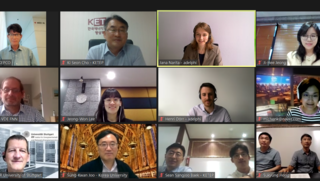WG2 Workshop "Short-term Flexibility Provision via Electric Vehicles"

On August 30 and 31, an online expert workshop on the ‘Potentials of Providing Short-term Grid Flexibility via Electric Vehicles’ took place within Working Group 2 ‘New Green Energy Technologies’. The workshop was jointly organized by the AHK Korea, the Korea Institute of Energy Technology Evaluation and Planning (KETEP) and adelphi. The aim was to assess the flexibility potential, identify challenges and develop solutions and best practices for the successful and efficient grid integration of electric vehicles (EVs) in Germany and Korea.
The first day (30 August) focused on policy measures that enable and advance the flexibilization of power grids and discussed the current state of grid integration of battery electric vehicles, as well as potential common challenges and solutions ahead in Germany and Korea, e.g. through smart-charging strategies or V2G-technology. This first part showed that grid stability and flexibilization are a top priority in both countries and that electric vehicles could contribute to that in the future. Both countries have introduced appropriate tariff schemes and demand response programs to facilitate the flexible load-management of EVs. Nonetheless, especially in regard to V2G and the market integration of the flexibility options, there remains a lot to be done.
On the second day (31 August), the perspective and practical implementation of related projects from Korean and German industry and research representatives were highlighted based on existing pilot projects. It became clear that despite differences in, for instance, the design of the electricity market, problems and challenges for the introduction of EVs as a flexibility option in the electricity grid are similar in both countries. While the integration of V2G technology would already be possible from a technical point of view, both countries require a suitable regulatory framework that regulates the discharging of electricity from BEVs. Moreover, the design of incentive systems for private owners is of central importance, as participation in the electricity market via BEVs is currently not yet economically viable for them.
Overall, there is great potential for further cooperation and exchange between Korea and Germany on topics such as the design of incentive schemes for consumers and a regulatory framework, standardization of technical equipment and questions of concrete implementation by market actors as well as the overall market integration of flexibility options and related new actors such as aggregators and VPPs.
Please find the full agenda here.